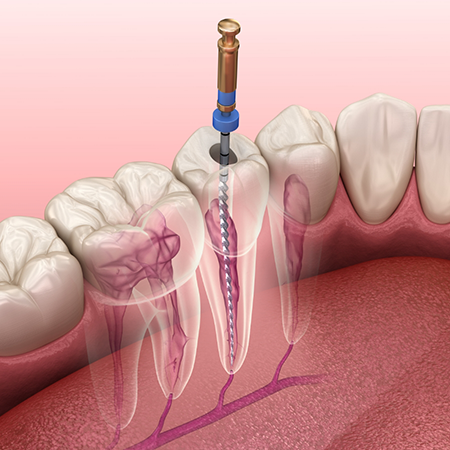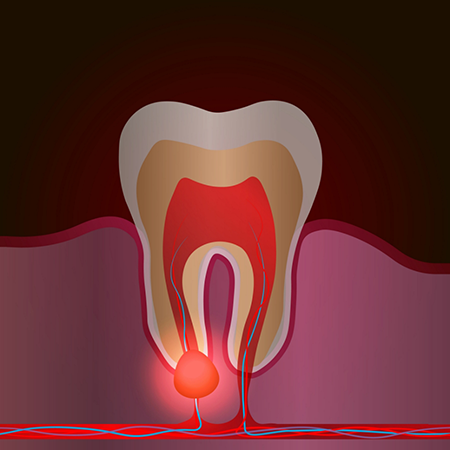Root Canal Treatment Allen
Relieve Your Pain and Save Your Tooth

When some people suffer from a toothache, they do everything possible to avoid going to the dentist because they are afraid of root canal treatment. But that is a mistake! There is no reason to be afraid of root canal treatment. In fact, it is often the best way to relieve severe dental pain. In many cases, it can even spare a damaged tooth from extraction. On this page, you will learn more about how root canal treatment in Allen works and how it can benefit your oral health.
Why Choose Advanced Dental Care of Allen for Root Canal Treatment?
- Same-Day Appointments for Patients in Pain
- We Accept Insurance & Offer Financing
- Effective Dental Sedation Offered
What Is Root Canal Treatment?

Root canal treatment becomes necessary when the innermost layer of a tooth, the pulp, becomes infected or damaged. The pulp may become inflamed, and the nerve inside the tooth may send strong pain signals, resulting in an agonizing toothache. The purpose of root canal treatment is to solve such issues.
During the procedure, your emergency dentist in Allen, Dr. Kar, carefully accesses the tooth’s interior chamber. Then, he uses special tools to clean out the damaged tissue and remove the tooth’s nerve. To help the tooth maintain its structure, he fills it in with a material called gutta percha. In most cases, a tooth that has been treated with a root canal requires a crown to maintain its function and strength.
Do You Need a Root Canal?

You may need root canal treatment if:
- You have a severe, throbbing toothache.
- One of your teeth is darker than the ones around it.
- You have a pimple-like sore on your gums.
- One of your teeth is extremely sensitive to hot and cold temperatures. The pain lingers even after the source of the temperature change is removed.
If you suspect you need root canal treatment, do not hesitate to schedule an emergency dental appointment. Delaying treatment could result in tooth loss, bone damage in the jaw, and other oral health complications. It may also give an infection the opportunity to spread beyond the tooth and result in systemic illness.
Benefits of Root Canal Treatment

Root canal treatment offers numerous benefits:
- It is comfortable. In the past, this treatment had a reputation for being extremely painful. Thanks to advances in dental techniques and technology, however, modern root canal treatment is quite comfortable. Many patients remark that it feels like getting a small filling.
- It can save your tooth from extraction. Retaining your nature teeth as long as possible is beneficial for your oral health, and it can spare you from the expense of tooth replacement.
- It provides fast pain relief. Your mouth might be a little sore after your treatment, but any pain related to damaged dental pulp will vanish immediately.
- It has a high success rate. Root canal treatment has over a 95% success rate.
Do you believe you may need root canal treatment? Get in touch with our team to request an appointment today. We’ll work fast to assess the problem, relieve your pain, and protect your long-term oral health.
Root Canal Treatment FAQs
I am not in pain — why would I need root canal treatment?
You may be quick to believe that you require root canal treatment only if you are suffering from a debilitating toothache. But in many cases, a root canal is necessary even when a patient is not in pain. This may be the case if you have an infection in the tooth that has not yet reached the point where it is causing discomfort. It may also be true if the nerve inside the tooth has died and is not able to send pain signals to your brain. If Dr. Kar determines that you require root canal treatment, he will clearly explain the reasons behind his treatment recommendation.
What does root canal treatment feel like?
Many patients remark that root canal treatment feels like getting a small filling. It is a relatively comfortable procedure. After you go home and the anesthesia wears off, some soreness and swelling are normal. Being careful about what you eat and carefully following Dr. Kar’s post-treatment instructions will help to make your recovery as easy as possible.
How can I prepare for root canal treatment?
You may not be able to eat for at least a few hours after your procedure, so it would be wise to have a meal about two hours or so before your appointment. Also, if you have any questions about the root canal treatment procedure, do not hesitate to ask. Being a well-informed patient can do much to calm any anxiety you may be experiencing. If you will be sedated during your procedure, you should arrange for someone to drive you to and from our office (particularly if you will be under the influence of oral conscious sedation).
How long does the root canal procedure take?
The duration of root canal treatment depends on how complex a case is. The procedure can take anywhere from an hour to 90 minutes or longer. You should plan on being in our office for at least a couple of hours.
How successful is root canal treatment?
Root canal treatment is successful in the majority of cases. In fact, it has a success rate of more than 95%. As long as you diligently follow aftercare instructions, your treated tooth could last a lifetime. In instances where the initial root canal treatment is not successful, endodontic retreatment might be necessary.
